Surging Ahead: In conversation with Deepak Khushalani, Founder & CEO of Premier Logistics
Deepak Khushalani, Founder & Chief Executive Officer of Premier Logistics, tells us about his vision for the company, how technology is at the forefront and its newly launched verticals
What’s the year 2021 been like for Premier Logistics?
The year was challenging for all businesses. COVID-19 and the economic fallout have highlighted the weak points in companies’ strategy, inventory, marketing, and transportation. If the pandemic has taught us anything, it is how to be agile. Companies are learning to adapt and innovate to meet these new challenges.
Anticipating future trends in the face of so much uncertainty is more vital than ever. For Premier Logistics the first half of the year was quite challenging, the uncertainty due to the prolonged nature of the pandemic and continued disruption in businesses for our customers made planning for the year quite difficult. However, in the second half, we seemed to observe momentum of inbound and outbound cargo for the larger clients, and an increasing lead pipeline for SME’s resuming their business orders and cargo movement.
 Since the firm’s establishment in 2016, you’ve grown leaps and bounds, was this how you envisioned Premier Logistics? Where do you see the company in the next 10 years?
Since the firm’s establishment in 2016, you’ve grown leaps and bounds, was this how you envisioned Premier Logistics? Where do you see the company in the next 10 years?
Over the last few years, we at Premier Logistics have moved towards an agile and asset-light strategy proving ourselves more resilient during the pandemic. Our asset-light model helps us serve numerous customer segments through numerous logistics networks that are based on shared assets and that leverage partners and digital tools to foster large-scale agility and responsiveness.
The last few years was primarily to establish our foundation within the industry and to introduce various verticals within the organization which we have successfully achieved. Premier Logistics successfully established a Finished Vehicles Logistics (FVL) division in collaboration with a leading vehicle distributor in the Middle East.
Moreover, we have also developed an in-house VAS department currently catering to over 70 brands within the Middle East, providing services such as co-packing, shrink-wrapping, labelling, barcoding, repackaging and much more. Due to the rapid expansion of our business, we have also managed to secure additional storage facilities (open yard and bulk storage) for project logistics with services such as lashing and crating for bulk items.
The strategy for the first five years of our journey has been accomplished to a great extent, but the next 10-year goal is to grow our profile substantially in terms of our employee base, turnover, and expansion into the wider GCC. These next few years are crucial in the sense of expansion and growth of technology in the business, where we are looking to be a major player in supporting the eCommerce sector as well as agency agreements where we see great growth with larger players globally.
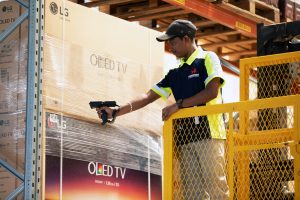 Tell us about your newly developed Finished Vehicles Logistics (FVL) division.
Tell us about your newly developed Finished Vehicles Logistics (FVL) division.
We have been offering dedicated logistics services for an automotive major in the UAE. Service offering includes collection from the manufacturing plant in China, inland movement, freight (between 50-100 cars every 45 days), customs clearance at Jebel Ali Port and carriage to yard for storage. Thereafter managing the local deliveries to their showrooms.
This project continues to grow and develop as we expand our footprint in terms of the space that is utilised not only for new cars but classic cars as well. This includes customs clearance, car maintenance (regular start etc.), delivery to local market to distributors as well as export clearance mainly to Africa.
What are some of the new verticals you’ve launched in 2020/2021?
Our continued focus has been to strengthen our value-added service division, which includes car lashing services. The expertise we have has expanded our volumes both inside and outside the free zone. Additionally, a new vertical as part of the value-added division has been packing and segregation of FMCG goods and textiles, this is a specialised job that requires packaging adhered to certain specific standards.
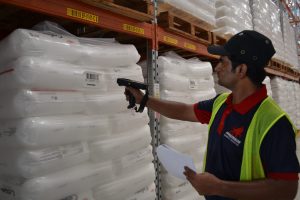 The automotive logistics sector has been booming in the past quarter. How has this impacted your business?
The automotive logistics sector has been booming in the past quarter. How has this impacted your business?
We have seen major operational limitations due to the COVID-19 pandemic, leading to shipment delays, port congestion, and higher freight rates. Supply chain issues impacted inventory wherein demand exceeded supply in the H1 of the year 2021, however, we work very closely with our clients and have seen an improvement in the movement due to our meticulous supply chain planning program along with their supply chain teams to ensure timely delivery and a uninterrupted supply chain.
What have been some of the key challenges you’ve encountered in the past two years?
The current health pandemic (COVID-19) has created quite a few challenges – urgent measures that had to be put in place, paramount being the safety of our staff, operational hurdles that had to be conveyed to our clients and how the organisation would work around new ways of doing things but ensure that we continue to operate as efficiently as possible.
We, at Premier Logistics, have seen major operational limitations which have led to delivery delays, congestion, and higher freight rates. However, not all segments have been impacted equally—companies that serve e-commerce are seeing increased activity as consumers opt for online shopping of essentials, while those that serve other sectors (such as retail consumer goods and automotive) are seeing a downturn in their business.
We realized that strength and resilience of employees was our key to overcoming obstacles posed by COVID-19 in the last two years.
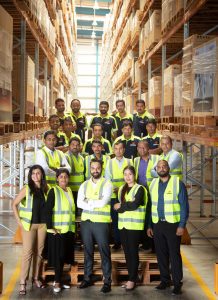 The logistics sector is undergoing a major revamp with technology at the core. What role does technology play at Premier Logistics?
The logistics sector is undergoing a major revamp with technology at the core. What role does technology play at Premier Logistics?
Premier Logistics’ primary focus is to put our efforts towards creating value for all our clients and being able to build innovative solutions to ensure the highest quality in warehousing and distribution. With our recent focus primarily on digital transformation of the age-old logistics industry, Premier Logistics has been consistently moving towards providing innovative solutions within the industry.
With the pandemic, we all realized the changes in consumer behavior and the quick adaptability of the consumer towards technology – primarily eCommerce and online shopping. These shifts in consumer behavior caused by the pandemic are expected to be the “new normal”.
As demand has spiked massively following the COVID-19 outbreak and social distancing measures are being taken by governments around the world, the ability for retailers to make products accessible to consumers is affected by two major factors: stock availability and delivery capacity. We at Premier Logistics feel that last mile delivery has always been an important element of the eCommerce customer experience.
What major changes do you see taking place in the logistics and supply chain industry?
The last two years were challenging for all businesses. COVID-19 and the economic fallout have highlighted the fragile points in companies’ strategy, inventory, marketing, and transportation. If 2020-2021 has taught us anything, it is how to be agile. Companies are learning to adapt and innovate to meet these new challenges.
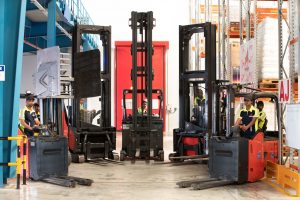 Anticipating future trends in the face of so much uncertainty is more vital than ever, and some future trends according to me are as follows:
Anticipating future trends in the face of so much uncertainty is more vital than ever, and some future trends according to me are as follows:
Warehousing:
Companies are looking towards better digital integrations of their supply chain. Now, trade flows are at the highest from across the globe – thanks to digitization. The transition of offline to online and larger inventory levels held by e-commerce players in the region, will speed up the warehousing demand further.
Managing Customer Expectations:
Due to a sudden surge in technological advancements, information can now be easily accessed by customers, resulting in higher expectations from companies within the logistics industry. Customers are now turning towards companies with a digital footprint and logistics companies have to embrace this digital change immediately or risk going out of business.
Collaboration:
Premier Logistics primary belief has always been of collaboration, and we feel that it is the perfect time for an asset-light approach and collaboration-heavy approach. Companies with heavy assets on their balance sheet will face difficulties for the next few years to recoup from the costs sustained during the pandemic.
We all know that several sectors will continue to grow amidst the new normal – sectors such as e-commerce, last mile delivery, warehousing services for basic needs and retail goods will see continuous growth. Therefore, it is time to collaborate and synergize with organizations that can utilize each other’s strengths.
Risk Management:
Risk management will be of utmost priority for all logistics companies. While shippers and 3PL’s are learning to adapt and innovate, they will also need to plan their readiness for any contingencies and business continuity as areas in most need of strengthening post-pandemic.

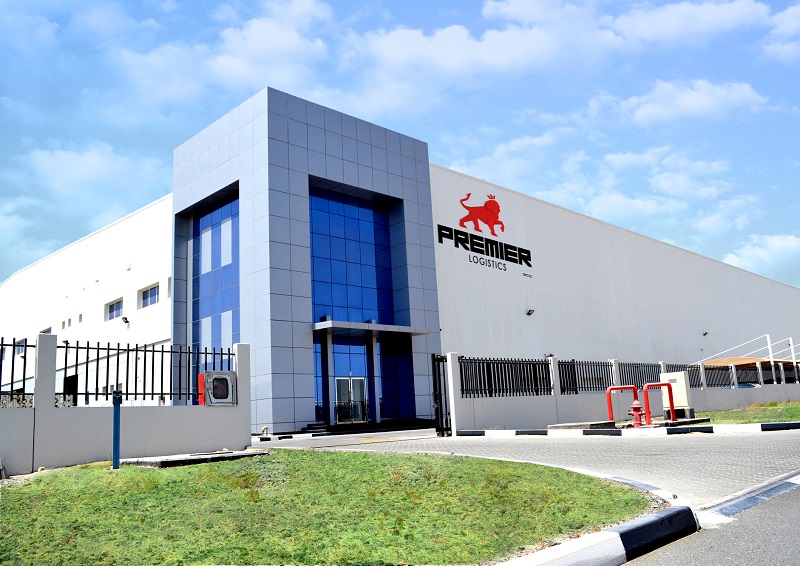


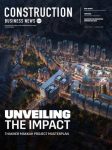



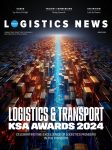













 Kuwaiti developer URC signs with Ahmadiah Contracting for the Commercial District development at Hessah AlMubarak
Kuwaiti developer URC signs with Ahmadiah Contracting for the Commercial District development at Hessah AlMubarak